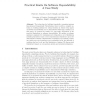Free Online Productivity Tools
i2Speak
i2Symbol
i2OCR
iTex2Img
iWeb2Print
iWeb2Shot
i2Type
iPdf2Split
iPdf2Merge
i2Bopomofo
i2Arabic
i2Style
i2Image
i2PDF
iLatex2Rtf
Sci2ools
105
click to vote
ADAEUROPE
2010
Springer
2010
Springer
Practical Limits on Software Dependability: A Case Study
The technology for building dependable computing systems has advanced dramatically. Nevertheless, there is still no complete solution to building software for critical systems in which every aspect of software dependability can be demonstrated with high confidence. In this paper, we present the results of a case study exploration of the practical limitations on software dependability. We analyze a software assurance argument for weaknesses and extrapolate a set of limitations including dependence upon correct requirements, dependence upon reliable human-to-human communication, dependence upon human compliance with protocols, dependence upon unqualified tools, the difficulty of verifying low-level code, and the limitations of testing. We discuss each limitation’s impact on our specimen system and potential mitigations.
ADAEUROPE 2010 | Dependable Computing Systems | Software Assurance Argument | Software Dependability | Software Engineering |
Related Content
| Added | 18 Jul 2010 |
| Updated | 18 Jul 2010 |
| Type | Conference |
| Year | 2010 |
| Where | ADAEUROPE |
| Authors | Patrick J. Graydon, John C. Knight, Xiang Yin |
Comments (0)

